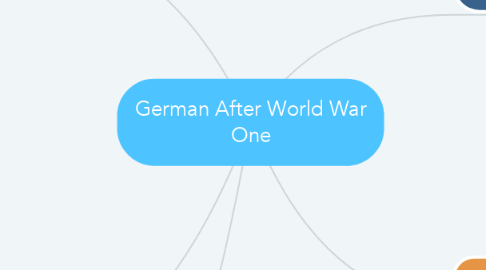German After World War One
by Tommy Cranmer

1. Strength and weakness of the new constitution
1.1. Some of the strengths of the new constitution, were - The bill of rights which guaranteed every German citizen freedom of speech and religion, and equality under the law. - All men and women were given the vote at age 20, this was very forward at the time. - There was an elected president and an elected Reichstag.
1.2. There were two hidden flaws in this constitution, Proportional representation, this was the Weimar Germans voted for a party. Each party was then allocated seats in the Reichstag exactly reflecting (proportional' to) the number of people who had voted for it. In practice it was a disaster it resulted in dozens of tiny parties, with no party strong enough to get a majority, and, therefore, no government to get its laws passed in the Reichstag. This was a major weakness of the Republic. Another flaw was it said that, in an emergency, the president did not need the agreement of the Reichstag, but could issue decrees. The problem with this was that it did not say what an emergency was, and in the end, it turned out to be a back door that Hitler used to take power legally.
2. Reactions to the treaty of versailles
2.1. Germany were extremely unhappy with the treaty. This was mainly due to the fact that they had not been given a chance to negotiate, and they had been made to admit that they were the cause of the war. They had had also lost so much in the treaty which even countries such as Britain thought was far too harsh.There was a revolution attempt called the Kapp Putsch against the treaty in Berlin in 1920. Germany hated reparations. It had to be made to pay in 1921, in 1923 and eventually Hitler refused to pay altogether.
3. The French occupation of the Ruhr.
3.1. In 1923 The French sent 60,000 men to occupy the Ruhr land. This was because Germany said they needed two more years to pay of their reparations - from 1921 back to 1923. The french didn't believe that they couldn't pay so they took over there main natural resources and decided to take out the money them- selfs. This led to hyperinflation for Germany and a crippling depression as Germany needed to pay there workers whom had been striking.
4. Causes and effects of hyperinlation
4.1. What caused Hyperinflation was German workers not being paid as they weren't working, in protest against the french. So the government. Printed money to pay them.
4.2. The effect this had were; prices ran out of control - eg a loaf of bread, which cost 250 marks in January 1923 had risen to 200,000 million marks in November 1923. The people that were hit the worst was Pensioners for example, one woman sold her house with the intention of using the money to live on. A few weeks later, the money wasn't even enough to buy a loaf of bread.
5. The German Revolution of 1918
5.1. The german Revolution was caused by an angry Germany, mainly from soldiers who had believed that it was the jews and communists that had "Stabbed them in the back" and made them surrender after 4 years of war. The revolution started with the exile of the Kaiser, and the end of all monarchy in Germany. Which led to the establishment of the Weimer republic.


